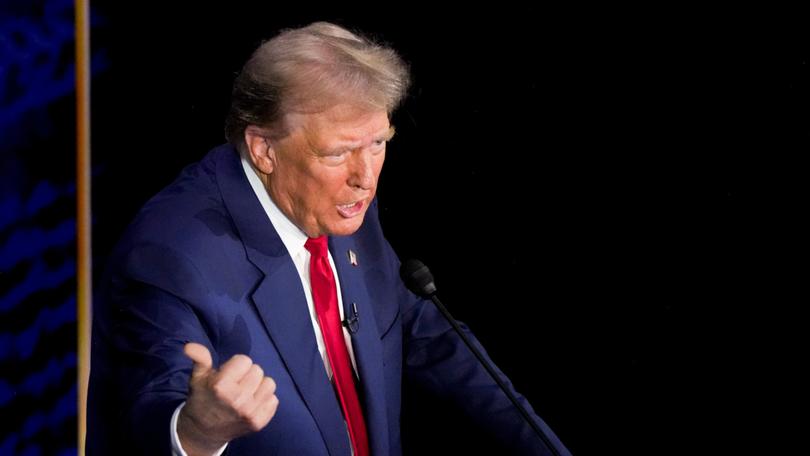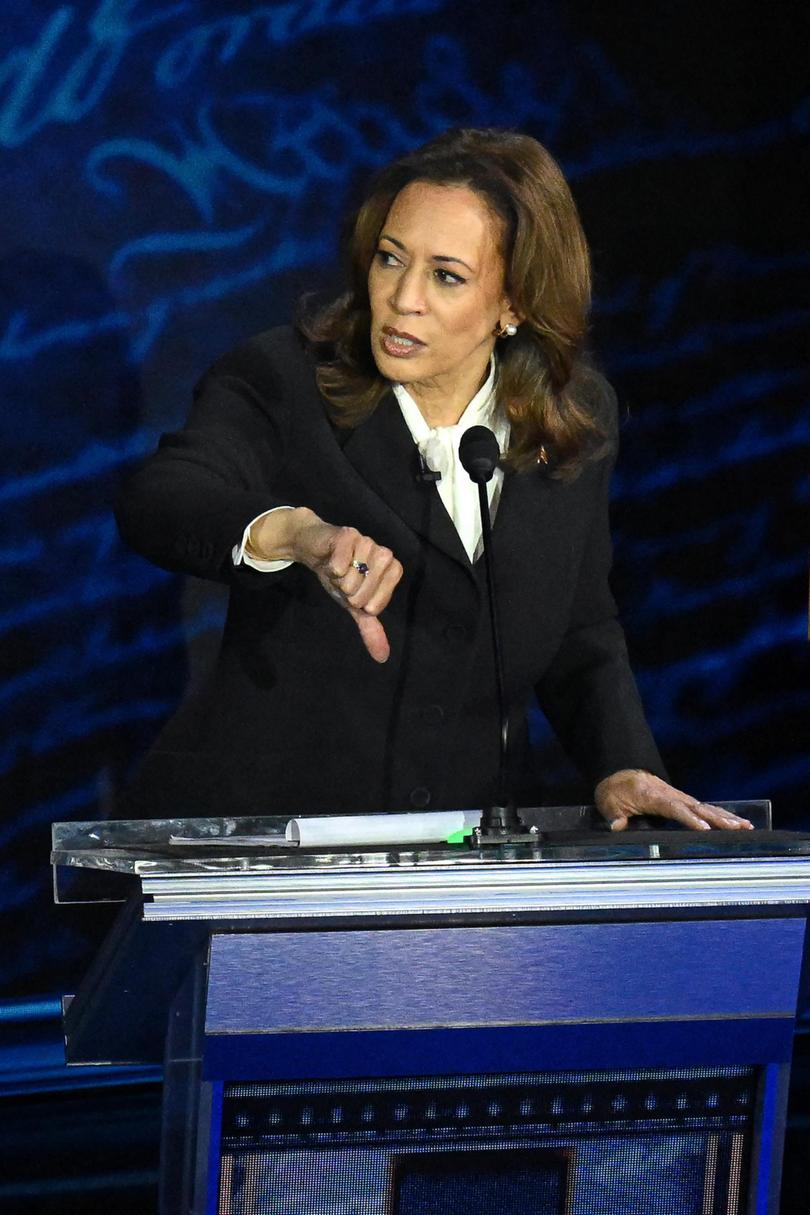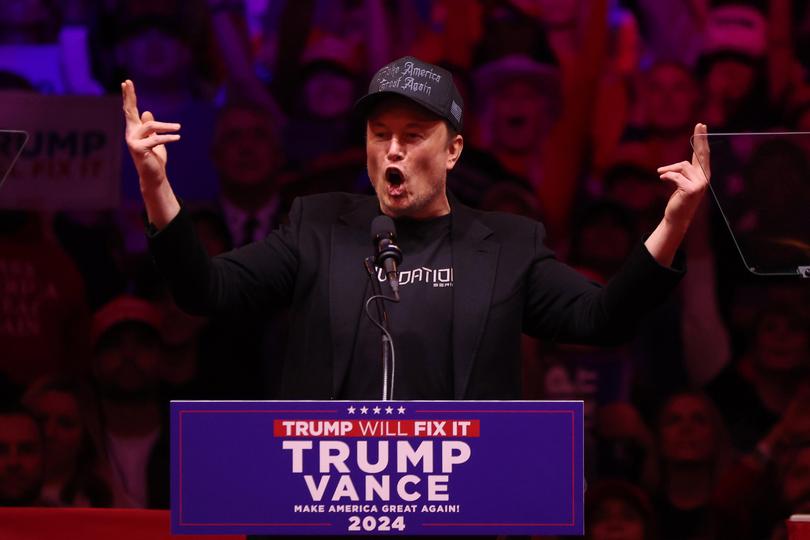US election: Your guide to the US presidential election
What, exactly, can we expect of the day and how does it all work?

While denizens of Britain set fire to effigies of their politicians and here in Australia we’ll be donning hats and suits for the Melbourne Cup on November 5, voters over in the United States of America will be preparing to legally overthrow their government.
In one of the most talked about elections in decades, Vice-President Kamala Harris and former president Donald Trump will go head to head in the polls.
So what, exactly, can we expect of the day and how does it all work?
Sign up to The Nightly's newsletters.
Get the first look at the digital newspaper, curated daily stories and breaking headlines delivered to your inbox.
By continuing you agree to our Terms and Privacy Policy.When do voters go to the polls?
Election day is on Tuesday, with most in-person polling places opening about 6-7am US local time.
The first polls will close from 6pm US Eastern Time, or 7am on Wednesday for those of us here in Western Australia, with the majority set to be done and dusted by 8pm US Eastern Time, about 9am our time.
Alaska and Hawaii will be the last to close off at 1pm WA time.
However, early voting is well under way with senior officials from the Harris campaign touting early data which they say shows women voters turning out at a higher clip than men across battleground States.
Trump previously railed against early voting, steering his supporters to vote on election day instead, but his allies have reportedly convinced him to support alternative options this cycle.

And he has indeed boasted about early-vote turnout and asks his rally crowds if they’ve already voted, with scores of them cheering and raising their hands.
Harris’ campaign says it’s Trump’s die-hard supporters who are simply voting earlier, rather than swing voters flocking to support him.
Mail-in and absentee ballots will also need to be accounted for.
What is this Electoral College thing all about?
It’s a common misconception that Americans directly vote for the president of their country. In fact, that honour is actually held by the Electoral College.
Unlike our relatively straightforward preferential Federal election voting system — whereby voters choose a Parliament and then the leader of the party with the greatest number of seats in the House of Representatives becomes Prime Minister — the US presidential system relies on everyday voters actually voting for the Electoral College itself.
To really confuse everyone, in some States only the names of the electors are listed on the ballot paper, in others only the names of the presidential candidates, and still others list both.
Under the Electoral College system, each State sends a specified number of “electors” — with 538 in total — to Congress on December 14 to cast votes. They are meant to cast their votes for the candidate who triumphed in their respective State’s election.
What it all, effectively, means is that it’s entirely possible that a candidate may receive a majority of votes overall and yet still not be named president.
All eyes, of course, will be peeled on the seven so-called battleground States, which are those that could swing in the favour of either candidate.
So what are the major policies of both candidates?
Thousands of column inches have been dedicated to picking apart the policies of both candidates, but key areas of disagreement have mainly been over foreign policy, taxes, immigration and women’s rights.
While Harris is an unapologetic advocate for reproductive rights and wants to legalise abortion nationally after the overturn of Roe v Wade, thanks in part to Trump-appointed Supreme Court judges, he on the other hand hasn’t had a consistent message, saying instead that he wants to leave the relevant legislation to the states.
When it comes to taxes, Trump has teased the idea of completely eliminating individual income taxes — which account for approximately half of the Federal government’s annual revenue — instead he wants to rely on massively increasing tariffs on foreign imports.
Meanwhile, Harris says “the tax code should work for working Americans.” She also wants to ease taxes on working families and provide children tax credits, whilst increasing taxes for big business and those who earn an income of more than $US400,000.
Trump has vowed to complete the construction of a wall between America’s southern border with Mexico which commenced in his first term while also promising a mass deportation of undocumented immigrants.
It comes as many pundits have criticised the Biden administration for allowing “out-of-control” immigration during its term.
And what about the bit that probably matters most to Australians . . .
Foreign policy will look vastly different depending on who next enters 1600 Pennsylvania Avenue on January 20.
Trump’s “America First” rhetoric has been one of his strongest messages throughout the campaign, but details on what he would actually do have been relatively light.
He famously said he would end the war in Ukraine in a single day by settling the matter in a phone call to Vladimir Putin. He also threatened to cut off US military support to Volodymyr Zelensky.
During his first debate with President Joe Biden (who was then the presidential candidate again), he claimed the war wouldn’t have happened if he was in office.
“If we had a real president, a president that knew — that was respected by Putin . . . he would have never invaded Ukraine,” he said.
On conflict in the Middle East, Trump has positioned himself as a protector of Israel. Israeli Prime Minister Benjamin Netanyahu once referred to him as “the best friend Israel has ever had in the White House”.
Financially, Trump has pledged to enforce even tougher tariffs on China rising to 60 per cent, which could have an effect on the global supply chain.
Harris’ messages on the topic have been more nuanced.
She is against widespread tariffs on all imports, but rather wants to introduce a targeted approach, including looking at changes to tariffs on electric vehicles imported from China.
As the war between Russian and Ukraine heads into a fourth year, the current Vice-President has publicly supported the latter. However, she has stopped short of supporting Ukraine’s potential NATO membership.
On the Middle East, she has urged a two-state resolution and called for a ceasefire. However, the Biden administration has funded the Israeli military to the tune of $US12 billion, and Harris has said she “will always give Israel the ability to defend itself”.
Celebrity factors
As always, many eyes are on which celebrities and influencers are barracking for each side and both candidates are continuing to court celebrity endorsements in the closing days of the campaign, in hopes of attracting voters who may not be closely paying attention to the race.
Harris was set to be joined at a rally on Friday in Milwaukee by rapper and songwriter Cardi B, expected to deliver remarks encouraging early voting. Musical guests GloRilla, Flo Milli, MC Lyte, The Isley Brothers, and DJ Gemini Gilly will also perform.
During a campaign event in Atlanta in swing-state Georgia on Saturday, the Vice-President’s supporters will be treated to performances by artists 2 Chainz, Big Tigger, Monica and Pastor Troy.
And on Thursday, basketball superstar LeBron James endorsed her.
Trump’s campaign, meanwhile, is touting the endorsement of YouTube star and professional boxer Jake Paul, who boasts millions of subscribers on the video platform.

Billionaire, Elon Musk’s pro-Trump America PAC has been giving away $US1 million every day until election day to a randomly selected registered voter who signs a petition calling for free speech and the right to bear arms.
The contest doesn’t specify which candidate voters should choose, but Musk has become a famous champion of Trump — on his social media platform X and elsewhere — and the contest features photographs of Musk handing winners oversize cheques.
The father of 12 kids was in due court on Thursday to temporarily stave off a legal challenge to his giveaway after Philadelphia District Attorney Larry Krasner sued him over the sweepstakes, claiming it violates state lottery and consumer protection law. Musk failed to turn up.
So, who will win?
While Trump and his allies are telling supporters that they’re on pace for a runaway victory barring fraud — setting the stage for outrage and legal challenges if the election doesn’t break in favour of Republicans — Harris campaign senior officials said on a Thursday call with reporters that they were also feeling good about their prospects. They argue that Trump’s claims are a sign that he’s worried he will lose.
The reality is that in most official polls the candidates appear neck-and-neck.
“A race that is tied doesn’t have a frontrunner,” said Charlie Cook, founder of the Cook Political Report. “Polling is not, never was and never will be precise enough to pinpoint a leader when it is fundamentally tied. All swing States are well within the margin of error.”
If you are superstitious, many online forums pin it that cult cartoon series The Simpsons may already have predicted the outcome of the race.
In the season 11 episode — first aired in 2000 — “Bart to the future”, Lisa Simpson is depicted as president, and wears a purple suit and pearl necklace and earrings, in an eerie precursor of Harris’ sartorial decisions during her campaign this year.
Meanwhile, if you were wanting a slightly more scientific predictor the so-called Nostradamus of US elections, historian Allan Lichtmann, also says Harris is a good bet. He has correctly predicted the winner of the past nine out of 10 polls using what he calls his “keys to the White House system”. His only fail was the 2000 race in which George W. Bush beat favourite Al Gore.
Gore was famously a victim of the Electoral College system, pipped to the presidential post despite having won the popular vote by 543,895.
If you are the sort of person who likes to put their money where their mouth is, and believe the odds are ever in the candidates’ favour, SportsBet is firmly placing Trump on the top of the podium. They are offering odds of 1.53:2.40 as of Friday afternoon.
TAB largely agree, offering odds of 1.53:2.50 in Trump’s favour.
Additional reporting by Sofia Fimognari, Ezra Kaye, Reuters and Bloomberg.
